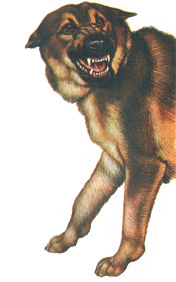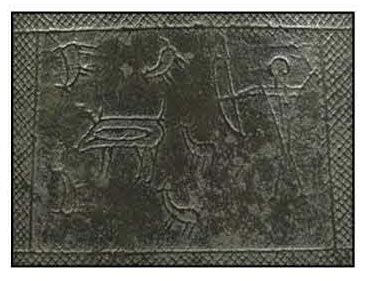Research Suggests Dogs Helped Early Modern Humans Hunt
Japanese Based Study Suggests Early Modern Humans Used Dogs to Hunt
Most scientists agree that dogs and our own species have had a symbiotic relationship for many thousands of years. It has been speculated that before dogs became our companions they co-operated with us in hunting. Here are two diurnal pack animals, in essence, both going after the same game, but archaeological evidence to support this idea has been very difficult to track down. True, there have been a number of canine burials associated with early, modern humans and we have written about some of these discoveries on this blog site.
Early Modern Human Hunting Strategies
However, new research, a study of over one hundred ancient burial sites in Japan has provided the strongest evidence yet that dogs did indeed assist with hunting. In fact, our reliance on dogs may have played an extremely significant part in our ability to survive in some parts of the world.
Research Suggests Dogs Played an Important Role in Hunting

A diurnal hunter like our species but with different colour perception – a useful hunting companion?
Whilst attending Durham University, graduate student Angela Perri had the opportunity to take part in a wild boar hunt in dense forest close to the city of Hiroshima (Honshu Island, Japan). She wanted to get a sense of the reliance hunters had on the use of dogs, to see how dependent hunters were on their four-legged, canine counterparts.
Dogs Used for Hunting
Angela explained:
“It was terrifying. The boar sound like a train. They’re very aggressive and they have big tusks. At any moment, one could come charging at you.”
The dogs (five bloodhounds and a Shiba Inus, a breed native to Japan, bred to help hunt small game), certainly made a big impression on her. Their ability to detect, chase and corner a dangerous quarry whilst at the same time offering protection to the humans struck a chord with her and she set off on a quest to try and establish once and for all the role dogs played in early human hunting parties. This subject area would be the basis for her dissertation whilst at Durham University.
The Jōmon Culture
Keen to understand the hunter/dog relationship in more detail, Angela began to examine the scientific literature. She focused on the Jōmon culture, a group of hunter-gatherers who inhabited the islands of Japan from the very late Pleistocene to around 2,400 years ago. The Jōmon culture spread throughout the islands that make up Japan. In the northernmost part of the archipelago they subsisted on dolphins and whales, whilst those in the tropical south engaged in more traditional fishing.
The Jōmon on Honshu were beachcombers, collecting mussels and other shellfish, but they were also very dependent on the dense forests and hunting was a big part of their lives. As the Holocene Epoch dawned, the fauna and flora changed and deer and wild boar became commonplace.
As a Postdoctoral Research Fellow at the Department of Human Evolution, (Max Planck Institute for Evolutionary Anthropology, Leipzig, Germany), Angela is very well placed to gain an understanding as to the evolution of our relationship with dogs. She proposes that dogs would have been highly valued by the Jōmon people, those on Honshu Island in particular. Her idea is supported by what she found when she scanned the Japanese archaeological record. Various archaeological digs dating back to around 9,000 years ago on Honshu show that the Jōmon began to bury dogs in shell middens, similar to human graves.
Studying Grave Sites
Like the people, the corpses of dogs were placed singly and appear to have been arranged with care in particular postures, as Angela says: “they looked like they curled up and went to sleep”.
A number of the bones revealed what could have been hunting injuries, broken legs and teeth. Many of the bones had healed suggesting people had taken care of them. Some dogs were also found with grave goods, like seashell bracelets and deer antlers.
A total of 110 burial records were studied in all, the most recent of which dating from about 2,500 years ago when the Jōmon adopted a more sedentary, farming based culture. Bones of dogs recovered from archaeological sites dating from after the reliance on hunting ended, show that many dogs were eaten, bones are found as random piles. It seems that from about 2,500 years ago, dogs lost their high status in Jōmon society.
Japanese Dogs were Revered
The fact that the Japanese dogs were only revered in a time and place where they would have made ideal hunting companions strongly suggests that they did indeed play this role. Writing in the journal “Antiquity”, Perri proposes that dogs were indeed central to many early human hunter-gatherer cultures, especially those the relied on hunting game for their survival. She also points to a 2500-year-old bronze bell found on the east coast of Honshu Island that contains an engraving believed to depict an event from even further in the past, a boar surrounded by a hunter and his pack of dogs, to support her theory.
A View of the Ceremonial Bronze Bell with the Hunting with Dogs Scene
Picture credit: Tokyo National Museum
The picture above shows a relief from a ceremonial bronze bell (dotaku) from the Pacific Honshu region depicting a hunter with a bow and arrow hunting a wild boar, surrounded by a pack of dogs.
Visit Everything Dinosaur’s website: Everything Dinosaur.


